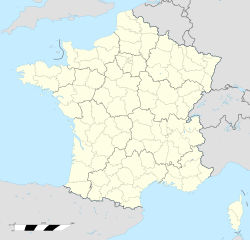Folies Bergère facts for kids
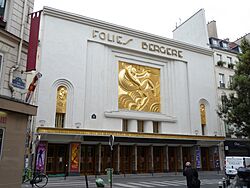
2013, after renovation of facade (originally created in 1926)
|
|
| Address | 32 Rue Richer Paris France |
|---|---|
| Coordinates | 48°52′27″N 2°20′42″E / 48.8742°N 2.3449°E |
| Designation | Cabaret music-hall |
| Construction | |
| Opened | 2 May 1869 |
| Architect | Plumeret |
The Folies Bergère (French pronunciation: [fɔ.li bɛʁ.ʒɛʁ]) is a cabaret music hall, located in Paris, France. Located at 32 Rue Richer in the 9th Arrondissement, the Folies Bergère was built as an opera house by the architect Plumeret. It opened on 2 May 1869 as the Folies Trévise, with light entertainment including operettas, comic opera, popular songs, and gymnastics. It became the Folies Bergère on 13 September 1872, named after nearby Rue Bergère. The house was at the height of its fame and popularity from the 1890s' Belle Époque through the 1920s.
Revues featured extravagant costumes, sets and effects. In 1926, Josephine Baker, an African-American expatriate singer, dancer and entertainer, caused a sensation at the Folies Bergère by dancing in a costume consisting of a skirt made of a string of artificial bananas.
The institution is still in business, and is still a strong symbol of French and Parisian life.
Contents
History
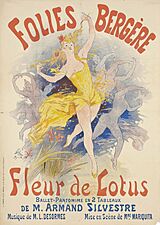
Located at 32 Rue Richer in the 9th Arrondissement, the Folies Bergère was built as an opera house by the architect Plumeret. The métro stations are Cadet and Grands Boulevards.
It opened on 2 May 1869 as the Folies Trévise, with light entertainment including operettas, opéra comique (comic opera), popular songs, and gymnastics. It became the Folies Bergère on 13 September 1872, named after a nearby street, Rue Bergère ("bergère" means "shepherdess").
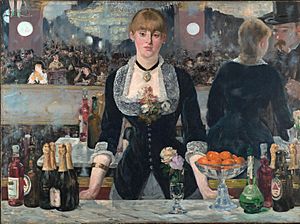
In 1882, Édouard Manet painted his well-known painting A Bar at the Folies-Bergère which depicts a bar-girl, one of the demimondaines, standing before a mirror.
In 1886, Édouard Marchand conceived a new genre of entertainment for the Folies Bergère: the music-hall revue. Women would be the heart of Marchand's concept for the Folies. In the early 1890s, the American dancer Loie Fuller starred at the Folies Bergère. In 1902, illness forced Marchand to leave after 16 years.
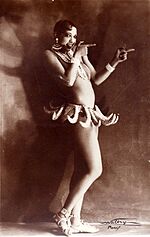
In 1918, Paul Derval (1880–1966) made his mark on the revue. His revues featured extravagant costumes, sets and effects. During his 48 years at the Folies, he launched the careers of many French stars including Maurice Chevalier, Mistinguett, Josephine Baker, Fernandel and many others. In 1926, Baker, an African-American expatriate singer, dancer, and entertainer, caused a sensation at the Folies Bergère in a new revue, La Folie du Jour, in which she danced a number Fatou wearing a costume consisting of a skirt made of a string of artificial bananas. The Folies Bergère catered to popular taste. Shows featured elaborate costumes. Shows also played up the "exoticness" of people and objects from other cultures, catering for the Parisian fascination with the négritude of the 1920s.
In 1926 the facade of the theatre was given a complete make-over by the artist Maurice Pico. The facade was redone in Art Deco style, one of the many Parisian theatres of this period using the style.
In 1936, Derval brought Baker from New York City to lead the revue En Super Folies. Michel Gyarmathy, a young Hungarian arrived from Balassagyarmat, his hometown, designed the poster for En Super Folies, a show starring Baker in 1936. This began a long love story between Michel Gyarmathy, Paris, the Folies Bergère and the public of the whole world which lasted 56 years. The funeral of Paul Derval was held on 20 May 1966. He was 86 and had reigned supreme over the most celebrated music hall in the world. His wife Antonia, supported by Michel Gyarmathy, succeeded him. In August 1974, the Folies Antonia Derval passed on the direction of the business to Hélène Martini, the empress of the night (25 years earlier she had been a showgirl in the revues). This new mistress of the house reverted to the original concept to maintain the continued existence of the last music hall which remained faithful to the tradition.
Since 2006, the Folies Bergère has presented some musical productions with Stage Entertainment like Cabaret (2006–2008) or Zorro (2009–2010).
Filmography
- 1935: Folies Bergère de Paris directed by Roy Del Ruth, with Maurice Chevalier, Merle Oberon, and Ann Sothern
- 1935: Folies Bergère de Paris directed by Marcel Achard with Maurice Chevalier, Natalie Paley, Fernand Ledoux. A French-language version of the 1935 Hollywood film.
- 1956: Folies-Bergère directed by Henri Decoin with Eddie Constantine, Zizi Jeanmaire, Yves Robert, Pierre Mondy
- 1959: Énigme aux Folies Bergère directed by Jean Mitry with Dora Doll, Claude Godard
- 1991: La Totale! directed by Claude Zidi with Thierry Lhermitte
Similar venues
The Folies Bergère inspired the Ziegfeld Follies in the United States and other similar shows, including a long-standing revue, the Las Vegas Folies Bergere, at the Tropicana Resort & Casino in Las Vegas and the Teatro Follies in Mexico.
In the 1930s and '40s the impresario Clifford C. Fischer staged several Folies Bergere productions in the United States. These included the Folies Bergère of 1939 at the Broadway Theater in New York and the Folies Bergère of 1944 at the Winterland Ballroom in San Francisco.
The Las Vegas Folies Bergere, which opened in 1959, closed at the end of March 2009 after nearly 50 years in operation.
A recent example is Faceboyz Folliez, a monthly burlesque and variety show at the Bowery Poetry Club in New York City.
See also
 In Spanish: Folies Bergère para niños
In Spanish: Folies Bergère para niños
- Absinthe
- Cabaret Red Light
- Casino de Paris
- Crazy Horse (cabaret)
- Folies Bergere at The Tropicana Hotel Las Vegas
- Jubilee!
- Le Lido
- Moulin Rouge
- Paradis Latin
- Sirens of TI
- Tropicana Club


